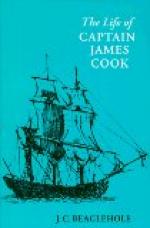The orders under which he sailed were secret, and, unfortunately, are not to be found. Admiral Wharton says the covering letter is in existence, but the orders which should be on the next page are missing. Cook writes:
“I was ordered, therefore, to proceed directly to Otaheite; and, after the astronomical observations should be completed, to prosecute the design of making discoveries in the South Pacific Ocean by proceeding to the South as far as the latitude of 40 degrees: then, if I found no land, to proceed to the west between 40 and 35 degrees till I fell in with New Zealand, which I was to explore, and thence return to England by such route as I should think proper.”
His last letter to the Admiralty, before leaving England, was written on the day of his arrival at Plymouth, informing them of that fact, and announcing his intention of proceeding to sea with all possible despatch.
CHAPTER 7. 1768 TO 1769. PLYMOUTH TO OTAHEITE.
After waiting for some days for a fair wind, Cook eventually sailed at 2 P.M. on 26th August, having, as he says in his Journal, “94 persons, including officers, seamen, Gentlemen and their servants; near 18 months’ provisions, 10 carriage guns, 12 swivels, with good store of ammunition, and stores of all kinds” on board. On 1st September they had heavy gales lasting for about four-and-twenty hours, and a small boat belonging to the boatswain was washed away, and “between three and four dozen of our poultry, which was worst of all,” were drowned. The ship was found to be very leaky in her upper works, and the sails in the store got very wet. Banks notes that they caught two birds in the rigging that had evidently been blown off the coast of Spain. On 13th September they anchored in Funchal Roads, and during the night “the Bend of the Hawser of the stream anchor slip’d owing to the carelessness of the person who made it fast.” The anchor was hauled up into a boat in the morning, and carried further out, but, unfortunately, in heaving it into the water, a Master’s mate, named Weir, got entangled in the buoy rope, was carried overboard, and drowned before any assistance could be rendered.
Whilst shifting her berth to a more convenient spot, the Endeavour was fired on by one of the forts owing to some misunderstanding, but satisfactory apologies and explanations were made, and it was thought so little of that neither Cook nor Banks mention it in their Journals. This incident is probably the origin of the story told by Forster in his Journal of the Second Voyage. He says:
“Captain Cook in the Endeavour battered the Loo Fort at Madeira in conjunction with an English Frigate, thus resenting an affront which had been offered to the British flag.”
When the Endeavour arrived at Funchal, the only British man-of-war there was H.M.S. Rose, which sailed the following day with her convoy, and neither her Captain’s Journal nor his ship’s log make any reference whatever to a dispute with the Portuguese. No other British man-of-war came into the port whilst the Endeavour was there, and afterwards, at Rio, Cook expressly informed the Viceroy that he had been well received by the Portuguese at Madeira.




